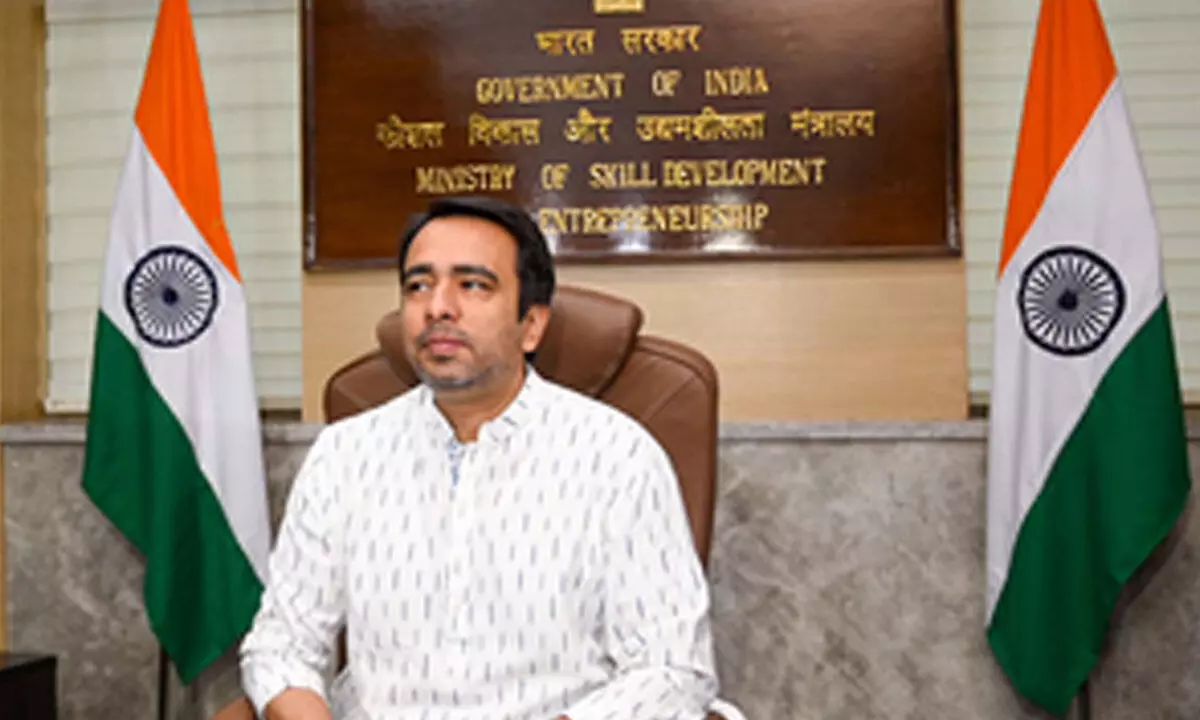Budget 2024 sets new precedent for prioritising job creation, skilling: Jayant Chaudhary
Share :

For the first time, the Union Budget 2024 places a significant focus on employment-linked schemes, setting a new precedent for prioritising job creation and skilling in our nation, Jayant Chaudhary, Minister of State for Skill Development and Entrepreneurship (Independent Charge) said on Wednesday.
New Delhi: For the first time, the Union Budget 2024 places a significant focus on employment-linked schemes, setting a new precedent for prioritising job creation and skilling in our nation, Jayant Chaudhary, Minister of State for Skill Development and Entrepreneurship (Independent Charge) said on Wednesday.
The Budget is a comprehensive blueprint for a prosperous and inclusive India.
"It embodies our collective aspirations and commitment to ensuring that every Indian achieves their life goals and dreams. Together, we will continue to build a resilient, skilled, and empowered nation," the minister said in a detailed note.
Focusing on critical sectors such as employment, skilling, MSMEs and support for the middle class, Finance Minister Nirmala Sitharaman has unveiled five key schemes and initiatives aimed at creating substantial employment and skilling opportunities.
This ambitious package is set to benefit 4.1 crore youth over the next five years, backed by a central outlay of Rs 2 lakh crore.
Furthermore, the Budget has allocated Rs 1.48 lakh crore specifically for education, employment, and skilling, underscoring the government's commitment to these vital areas.
"One of the standout features of this year's Budget is the introduction of three Employment-Linked Incentive schemes. These schemes represent a pivotal move towards fostering collective growth and prosperity, as they are designed to directly link incentives with employment generation, thereby ensuring that the benefits of economic growth are widely shared," said Minister Chaudhary.
The initiatives are poised to stimulate the MSME sector, enhance the employability of the workforce, and provide much-needed support to the middle class, ultimately driving inclusive growth and sustainable development for the nation.
This initiative provides a one-month wage upon joining the formal workforce, supported by a direct benefit transfer (DBT) equivalent to one month's salary (up to Rs 15,000) disbursed in three installments.
"With a salary cap of Rs 1 lakh per month, this scheme aims to support 2.1 crore youth entering the workforce for the first time," said the minister.
By targeting first-time employees, this scheme incentivises job creation in the manufacturing sector. It offers incentives related to Employees' PF Organisation (EPFO) contributions for both employees and employers during the first four years of employment, driving substantial job growth in this critical sector.
A centrally-sponsored scheme under Prime Minister Narendra Modi's package will skill 20 lakh youth over the next five years.
Over the next five years, 1,000 ITIs will be modernised through a hub-and-spoke model, supported by a total outlay of Rs 60,000 crore, the minister emphasised.
The 'Model Skill Loan Scheme' will be revised to facilitate loans up to Rs 7.5 lakh, with a guarantee from a government promoted fund. This measure is expected to benefit 25,000 students annually.
Furthermore, financial support for loans up to Rs 10 lakh for higher education in domestic institutions is announced, opening new avenues for our youth.
The fifth scheme under the Prime Minister's package is a strategic initiative to enhance youth employability and skill development by offering internships in 500 top companies to 1 crore youth over five years.
This programme provides 12 months of real-life business exposure, with an internship allowance of Rs 5,000 per month and a one-time assistance of Rs 6,000.
Participating companies will cover training costs and 10 per cent of the internship costs from their CSR funds.
"This scheme bridges the gap between academic knowledge and industry requirements, empowering young individuals with practical experience and financial support. It aligns with broader goals of improving employability, stimulating economic growth, and promoting sustainable development," the minister informed.
